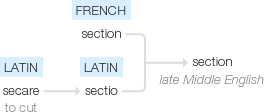Section
late Middle English (as a noun): from French section or Latin sectio(n- ), from secare ‘to cut’. The verb dates from the early 19th century.
wiktionary
From Middle English seccioun, from Old French section, from Latin sectio(“cutting, cutting off, excision, amputation of diseased parts of the body, etc.”), from sectus, past participle of secare(“to cut”). More at saw.
etymonline
section (n.)
late 14c., "intersection of two straight lines; division of a scale;" from Old French section or directly from Latin sectionem (nominative sectio) "a cutting, cutting off, division," noun of action from past participle stem of secare "to cut," from PIE root *sek- "to cut." From 1550s as "act of cutting or dividing." Meaning "subdivision of a written work, statute, etc." is from 1570s. Meaning "a part cut off from the rest" is from early 15c.
section (v.)
"divide into sections," 1819, from section (n.). Related: Sectioned; sectioning.
